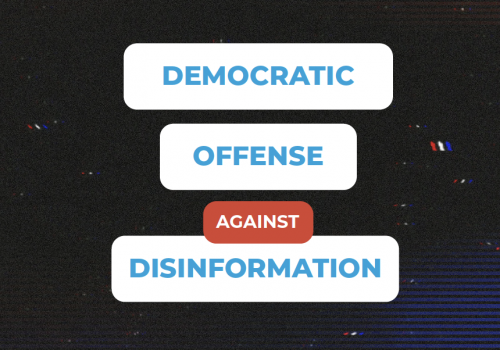
Credit: CEPA
The intentional use of misleading information to influence societies, or disinformation, presents a serious threat to the integrity of democratic systems, according to analysts Daniel Fried and Alina Polyakova. Authoritarian states regularly use it to exploit democracies’ open information systems, presenting a significant national security threat that demands a purposeful and concerted response, they write in Democratic Offense Against Disinformation, the third in a series of papers that deals with how democracies can build resilience against disinformation.
Democratic states have made progress defending against foreign and domestic disinformation, add NED board member Fried and CEPA’s Polyakova. While defensive measures cannot block all disinformation, they can limit disinformation as more people learn to filter it out on their own (“social resilience”). Defensive tactics based on democratic values can mitigate the impact of disinformation, but there remains a mismatch between the fast-evolving threat and the slow implementation of efforts to manage it.

Alina Polyakova/CEPA
We, therefore, recommend supplementing defense with offense. Our recommendations are designed for the United States; some may be adaptable by European governments and the European Union (EU) as well. Offense does not mean spreading disinformation (that would not be consistent with democratic values and democracies aren’t good at it anyway). It does mean building up, they contend:
- Cyber tools to identify and disrupt foreign disinformation operations. The U.S. Cyber Command (USCYBERCOM) has already launched this option — the U.S. military terms it “hunt, surveil, expose and disable.” It has the appeal of immediacy and directness, but at its harder-edged end it has drawbacks. The “disable” option needs to be implemented with care.
- Sanctions (and other financial) tools against disinformation actors and their sources of funding, and development of contingent retaliatory sanctions as a deterrent. Use of the sanctions tool requires persistence to apply well and its impact will be moderate rather than decisive. It will be more effective if carried out in parallel by the United States, the EU, and the United Kingdom.
- Support for free media in the broad sense, including journalists, activists, and independent investigators, can be the most effective tool of counter-disinformation. It is asymmetric — it does not directly counter disinformation — but plays to the greatest strengths of free societies dealing with authoritarian adversaries: the inherent attraction, over the long run, of truth. This was a key lesson of the Cold War, when 20th century methods, e.g., support for independent radio broadcasting at Radio Free Europe/Radio Liberty (RFE/RL), proved effective in reaching societies inside the Soviet Union and Soviet Bloc. Today, updated technologies, including direct, although unofficial, support for activist journalists working both inside and outside Russia (and China) may become a 21st century equivalent. China’s media and internet landscape is more restrictive than Russia’s but options exist there as well. These activities can be slow to yield measurable results but can have strategic impact over time, if applied with creativity and determination.

Daniel Fried/CEPA
The United States and, to some degree, the EU, NATO, and some European national governments, are already applying versions of these tools, but often haphazardly, without integrating them into a policy framework and with only spotty coordination. For the first two levels of tools, governments will have the lead; for the third, civil society groups will be critical and, in some cases, leading actors. RTWT
It’s time to cultivate a democratic offense against disinformation, argue @NEDemocracy board member @AmbDanFried & @cepa‘s @apolyakova https://t.co/wO49EI9L80
— Democracy Digest (@demdigest) December 2, 2020







